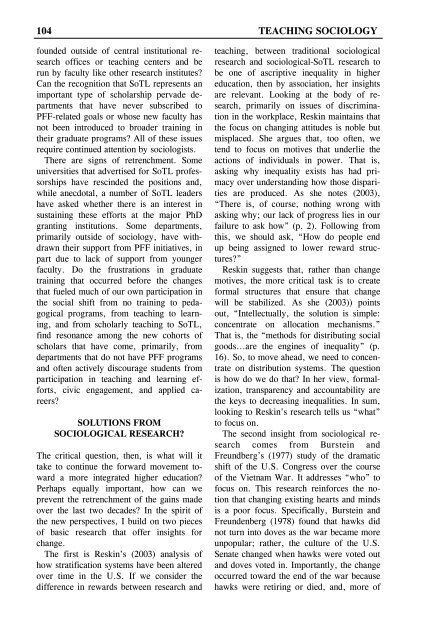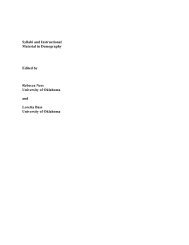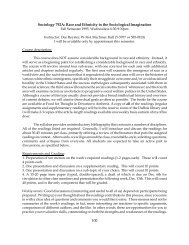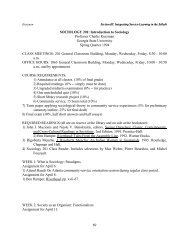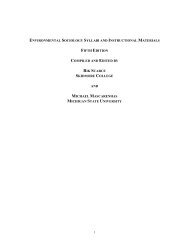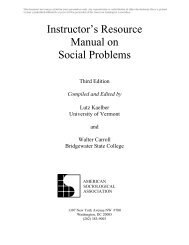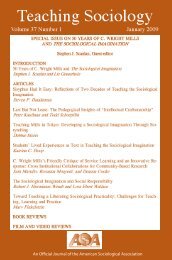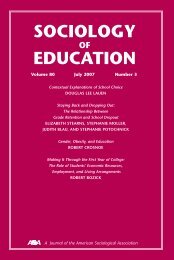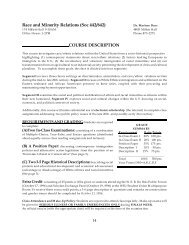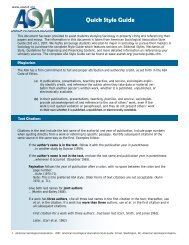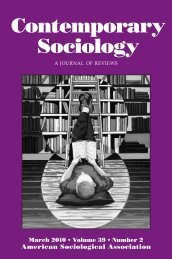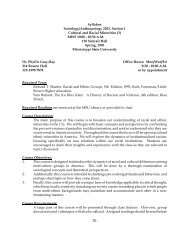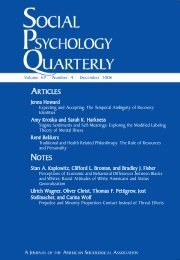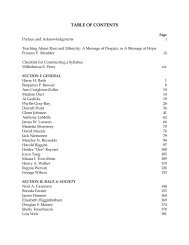3337 TS Vol36_2_APRIL 08 - American Sociological Association
3337 TS Vol36_2_APRIL 08 - American Sociological Association
3337 TS Vol36_2_APRIL 08 - American Sociological Association
Create successful ePaper yourself
Turn your PDF publications into a flip-book with our unique Google optimized e-Paper software.
104 TEACHING SOCIOLOGY<br />
founded outside of central institutional research<br />
offices or teaching centers and be<br />
run by faculty like other research institutes?<br />
Can the recognition that SoTL represents an<br />
important type of scholarship pervade departments<br />
that have never subscribed to<br />
PFF-related goals or whose new faculty has<br />
not been introduced to broader training in<br />
their graduate programs? All of these issues<br />
require continued attention by sociologists.<br />
There are signs of retrenchment. Some<br />
universities that advertised for SoTL professorships<br />
have rescinded the positions and,<br />
while anecdotal, a number of SoTL leaders<br />
have asked whether there is an interest in<br />
sustaining these efforts at the major PhD<br />
granting institutions. Some departments,<br />
primarily outside of sociology, have withdrawn<br />
their support from PFF initiatives, in<br />
part due to lack of support from younger<br />
faculty. Do the frustrations in graduate<br />
training that occurred before the changes<br />
that fueled much of our own participation in<br />
the social shift from no training to pedagogical<br />
programs, from teaching to learning,<br />
and from scholarly teaching to SoTL,<br />
find resonance among the new cohorts of<br />
scholars that have come, primarily, from<br />
departments that do not have PFF programs<br />
and often actively discourage students from<br />
participation in teaching and learning efforts,<br />
civic engagement, and applied careers?<br />
SOLUTIONS FROM<br />
SOCIOLOGICAL RESEARCH?<br />
The critical question, then, is what will it<br />
take to continue the forward movement toward<br />
a more integrated higher education?<br />
Perhaps equally important, how can we<br />
prevent the retrenchment of the gains made<br />
over the last two decades? In the spirit of<br />
the new perspectives, I build on two pieces<br />
of basic research that offer insights for<br />
change.<br />
The first is Reskin’s (2003) analysis of<br />
how stratification systems have been altered<br />
over time in the U.S. If we consider the<br />
difference in rewards between research and<br />
teaching, between traditional sociological<br />
research and sociological-SoTL research to<br />
be one of ascriptive inequality in higher<br />
education, then by association, her insights<br />
are relevant. Looking at the body of research,<br />
primarily on issues of discrimination<br />
in the workplace, Reskin maintains that<br />
the focus on changing attitudes is noble but<br />
misplaced. She argues that, too often, we<br />
tend to focus on motives that underlie the<br />
actions of individuals in power. That is,<br />
asking why inequality exists has had primacy<br />
over understanding how those disparities<br />
are produced. As she notes (2003),<br />
“There is, of course, nothing wrong with<br />
asking why; our lack of progress lies in our<br />
failure to ask how” (p. 2). Following from<br />
this, we should ask, “How do people end<br />
up being assigned to lower reward structures?”<br />
Reskin suggests that, rather than change<br />
motives, the more critical task is to create<br />
formal structures that ensure that change<br />
will be stabilized. As she (2003)) points<br />
out, “Intellectually, the solution is simple:<br />
concentrate on allocation mechanisms.”<br />
That is, the “methods for distributing social<br />
goods...are the engines of inequality” (p.<br />
16). So, to move ahead, we need to concentrate<br />
on distribution systems. The question<br />
is how do we do that? In her view, formalization,<br />
transparency and accountability are<br />
the keys to decreasing inequalities. In sum,<br />
looking to Reskin’s research tells us “what”<br />
to focus on.<br />
The second insight from sociological research<br />
comes from Burstein and<br />
Freundberg’s (1977) study of the dramatic<br />
shift of the U.S. Congress over the course<br />
of the Vietnam War. It addresses “who” to<br />
focus on. This research reinforces the notion<br />
that changing existing hearts and minds<br />
is a poor focus. Specifically, Burstein and<br />
Freundenberg (1978) found that hawks did<br />
not turn into doves as the war became more<br />
unpopular; rather, the culture of the U.S.<br />
Senate changed when hawks were voted out<br />
and doves voted in. Importantly, the change<br />
occurred toward the end of the war because<br />
hawks were retiring or died, and, more of


